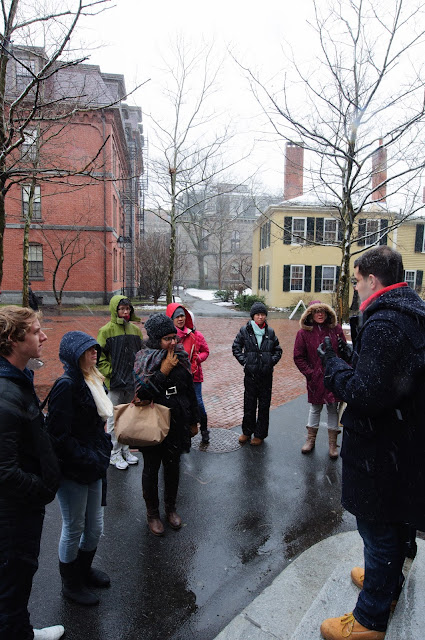 |
| 哥伦比亚大学 |
(1) 名校效应
(2) 经济能力
(3) 理想 VS 出路
(1) 名校效应
高中毕业生总有个“名校梦”,但是要入名校并不容易,录取条件苛刻不在话下,录取率只介于5% 到15%之间。其实,美国名校很多, 譬如史丹佛 (Stanford), 哈佛(Harvard), 麻省理工(MIT)等我们比较熟悉的,属于“超级名校”!
首先,所谓的名牌大学一般历史悠久、校园师资设备齐、学习风气盛、学术研究蓬勃、校园氛围好、学生素质超强、选择科系多范围广。他们几乎网罗了世界上所有的精英,能够毕业自这些大学的,是精英中的精英!
许多“背景显赫”的名校生,来自非富即贵的世家。所以,入名校,建立人脉关系,为未来合作创业奠下基础是名校生的“梦想‘。也是”超级“名校的一大优势。
最“佳”例子,马来西亚闹得如火如荼的 1MDB 案子里的主角之一,Jho Low 毕业自 University of Pennsylvania (Ivy League 常春藤大学之一) Whalton School of Business,他便是在大学里遇到来自中东的王子们,结果替我们的首相穿针引线,搞出高调的“丑闻”。
许多“背景显赫”的名校生,来自非富即贵的世家。所以,入名校,建立人脉关系,为未来合作创业奠下基础是名校生的“梦想‘。也是”超级“名校的一大优势。
最“佳”例子,马来西亚闹得如火如荼的 1MDB 案子里的主角之一,Jho Low 毕业自 University of Pennsylvania (Ivy League 常春藤大学之一) Whalton School of Business,他便是在大学里遇到来自中东的王子们,结果替我们的首相穿针引线,搞出高调的“丑闻”。
从另一个角度来看,入不入名校还要考虑其他因素。我喜欢的畅销书作者,Malcolm Gladwell 在 《David and Goliath》 这本书里说得好, The "Big Fish--Little Pond Effect"!
其实这也是我们一直在问的问题。
大鱼塘里的小鱼 LINK HERE
他说了一个很好的例子;一个聪明,成绩也很好的孩子进入名牌大学后发觉自己各方面技不如人(不是她不好,而是她周围都是和她一样好甚至更强的学生),结果她信心尽失,最后放弃了自己从小最喜欢的科学。后来她转到另一间不是顶尖的大学(声誉同样好),她反而重拾学习的乐趣。。。
这例子也告诉我们,发自内心的快乐幸福感其实都是相对的,自我感觉良好取决于我们周遭的环境,不知道你可赞成?环境对于人类的影响常常被低估。
我孩子的成绩还好,私底下是觉得她不够资格,再看到那么多孩子在名校激烈的竞争下栽了跟斗,我还是庆幸她不入名校。当然,能被顶尖大学录取,那股成就感肯定无与伦比,是每位学子追求的梦想。
然而,孩子们最终应该考虑名校生的优劣势,利与弊,衡量自己的能力,再决定是否要扣上“名校”这顶光圈,或选择能够承担又适合自己的大学;而不是一窝蜂追求名校。
在这方面,“名校”不一定好,“不是名校”也不一定不好;尤其对读 STEM 理工科系(science, technology, engineering, mathematics)的学生来说,差别就更小了。
根据下面一篇华尔街日报的报导,有一纸名校文凭的商科生与文科生,前途与待遇都无可限量。至于理工科毕业,只打算打工不创业的毕业生,名校不名校则没有不同,毕业后的薪金并没有差别。未来的前途讲求的是实力;刻苦耐劳,认真学习,积极向上才是上策。
最后,一点小小的心得:
·应该鼓励有能力的孩子申请名校,这里边讲的是接受挑战的精神,想要提升的动力
·名校固然好,关键还是实力。我们认为自己好,可是别人更好,这是需要接受的事实。素质好的大学多的是,要相信“天生我才必有用”
·超级名校最大的优势是建立人脉,为未来铺路
·如果大学里选读的是理工科,名不名校不太重要
·名校提供的是第一道门口,长远来说,能够自我鼓励,自我提升,刻苦耐劳才是最重要
·在小鱼塘里做大哥头也不错,自我感觉良好,你说呢?当然,太小的池塘就不太好啦~~~
上一篇:大学放榜之希望失望 1 HIT HERE
待续: (2) 经济能力, 与(3) 理想 VS 出路

大鱼塘里的小鱼 LINK HERE
他说了一个很好的例子;一个聪明,成绩也很好的孩子进入名牌大学后发觉自己各方面技不如人(不是她不好,而是她周围都是和她一样好甚至更强的学生),结果她信心尽失,最后放弃了自己从小最喜欢的科学。后来她转到另一间不是顶尖的大学(声誉同样好),她反而重拾学习的乐趣。。。
Excerpts Caroline wasn’t comparing herself to all the students in the world taking Organic Chemistry. She was comparing herself to her fellow students at Brown (one of the Ivy Leagues). She was a Little Fish in one of the deepest and most competitive ponds in the country—and the experience of comparing herself to all the other brilliant fish shattered her confidence. It made her feel stupid, even though she isn’t stupid at all. “Wow, other people are mastering this, even people who were as clueless as I was in the beginning, and I just can’t seem to learn to think in this manner.” Caroline Sacks was experiencing what is called “relative deprivation,” a term coined by the sociologist Samuel Stouffer during the Second World War. Our sense of how deprived we are is relative. This is one of those observations that is both obvious and (upon exploration) deeply profound, and it explains all kinds of otherwise puzzling observations. Which do you think, for example, has a higher suicide rate: countries whose citizens declare themselves to be very happy, such as Switzerland, Denmark, Iceland, the Netherlands, and Canada? or countries like Greece, Italy, Portugal, and Spain, whose citizens describe themselves as not very happy at all? Answer: the so-called happy countries. It’s the same phenomenon as in the Military Police and the Air Corps. If you are depressed in a place where most people are pretty unhappy, you compare yourself to those around you and you don’t feel all that bad. But can you imagine how difficult it must be to be depressed in a country where everyone else has a big smile on their face? The phenomenon of relative deprivation applied to education is called—appropriately enough—the "Big Fish–Little Pond Effect”. The more elite an educational institution is, the worse students feel about their own academic abilities. Students who would be at the top of their class at a good school can easily fall to the bottom of a really good school. Students who would feel that they have mastered a subject at a good school can have the feeling that they are falling farther and farther behind in a really good school. And that feeling—as subjective and ridiculous and irrational as it may be—matters. How you feel about your abilities—your academic “self-concept”—in the context of your classroom shapes your willingness to tackle challenges and finish difficult tasks. It’s a crucial element in your motivation and confidence. The Big Fish–Little Pond theory was pioneered by the psychologist Herbert Marsh, and to Marsh, most parents and students make their school choices for the wrong reasons. “A lot of people think that going to an academically selective school is going to be good,” he said. “That’s just not true. The reality is that it is going to be mixed. Do you know what elite institution has recognized this very fact about the dangers of the Big Pond for nearly fifty years? Harvard! In the 1960s, Fred Glimp took over as director of admissions and instituted what was known as the “happy-bottom-quarter” policy.In one of his first memos after taking office, he wrote: “Any class, no matter how able, will always have a bottom quarter. What are the effects of the psychology of feeling average, even in a very able group? Are there identifiable types with the psychological or what-not tolerance to be ‘happy’ or to make the most of education while in the bottom quarter?” He knew exactly how demoralizing the Big Pond was to everyone but the best. |
这故事说明,强强竞争下总有正面与负面的影响;高压力的学习方式,一方面能提升竞争力激发潜力;也可能患得患失,终究逃不出竞争失败所带来的挫折感,失去信心,患上忧郁症。。。
这例子也告诉我们,发自内心的快乐幸福感其实都是相对的,自我感觉良好取决于我们周遭的环境,不知道你可赞成?环境对于人类的影响常常被低估。
我孩子的成绩还好,私底下是觉得她不够资格,再看到那么多孩子在名校激烈的竞争下栽了跟斗,我还是庆幸她不入名校。当然,能被顶尖大学录取,那股成就感肯定无与伦比,是每位学子追求的梦想。
然而,孩子们最终应该考虑名校生的优劣势,利与弊,衡量自己的能力,再决定是否要扣上“名校”这顶光圈,或选择能够承担又适合自己的大学;而不是一窝蜂追求名校。
在这方面,“名校”不一定好,“不是名校”也不一定不好;尤其对读 STEM 理工科系(science, technology, engineering, mathematics)的学生来说,差别就更小了。
根据下面一篇华尔街日报的报导,有一纸名校文凭的商科生与文科生,前途与待遇都无可限量。至于理工科毕业,只打算打工不创业的毕业生,名校不名校则没有不同,毕业后的薪金并没有差别。未来的前途讲求的是实力;刻苦耐劳,认真学习,积极向上才是上策。
最后,一点小小的心得:
·应该鼓励有能力的孩子申请名校,这里边讲的是接受挑战的精神,想要提升的动力
·名校固然好,关键还是实力。我们认为自己好,可是别人更好,这是需要接受的事实。素质好的大学多的是,要相信“天生我才必有用”
·超级名校最大的优势是建立人脉,为未来铺路
·如果大学里选读的是理工科,名不名校不太重要
·名校提供的是第一道门口,长远来说,能够自我鼓励,自我提升,刻苦耐劳才是最重要
·在小鱼塘里做大哥头也不错,自我感觉良好,你说呢?当然,太小的池塘就不太好啦~~~
上一篇:大学放榜之希望失望 1 HIT HERE
待续: (2) 经济能力, 与(3) 理想 VS 出路

 |
| 2013年春天的哈佛,带我们游哈佛的是一位来自土耳其的学生 |

No comments:
Post a Comment